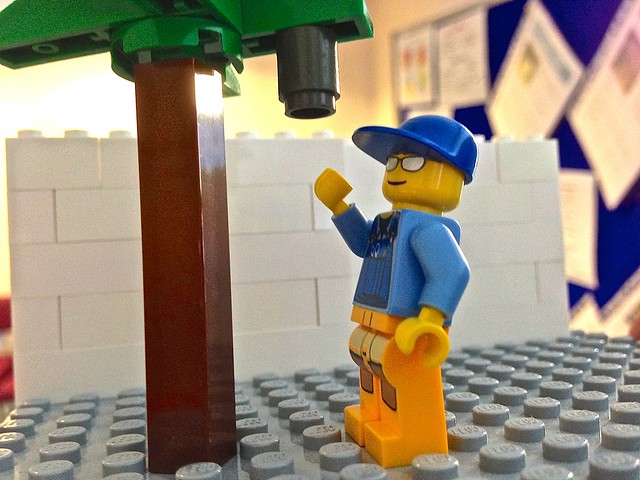Grocery
The fruits of our labour: an avocado's story

Year: 2007
Author: Freddie Abrahams
Type: Undergraduate dissertation
Full reference: Abrahams, F. (2007) The fruits of our labour: an avocado’s story.Undergraduate Geography dissertation, University of Birmingham
Availability: free of charge (pdf file, click to download).
Page reference: Abrahams, F. (2007) The fruits of our labour: an avocado’s story. followthethings.com (www.followthethings.com/avocadstory.shtml last accessed <insert date here>)
Lego re-creation

Opening scenes
The very beginning…December 2005
King’s Heath. An arctic afternoon, crawling my way along this previously unventured (by me) high street of suburban Birmingham. Unable to acquire an avocado for the impending evening’s meal, I was bitten, not by the cold, but something else. It was then that I could feel the nascent stages of this project unfold before my eyes. My thoughts became fixed, channelled, focused. I had been into at least half a dozen supermarkets and greengrocers only to emerge empty handed and frustrated. Why could I not find the fruit? Overwhelmed by exasperation, something had buried me. Disappointment lay all around; on the paving stones beneath my feet, on the spears of the nearby park’s gate, and on the barren thorns within it. I found myself drowned in it. I was cascading through the universe and faintly falling. All I was after was an avocado, what was to become my precious avocado. And so the journey began…..
I started to pay attention, the avocado-barren landscape of the suburb having left me thoroughly unfulfilled. However, when I returned home to London, I was confronted with streets littered with these pear-shaped specimens of perfection. So I kept thinking. And reading. And looking.
The detective work began. No Selly Oak supermarket aisle was left un-browsed as I went on the avocado’s trail. Countries of origin: Chile, Peru, Mexico, USA, Israel. Three different continents. One fruit…Different places, different spaces. I’d never even thought about it
‘It’s only food’, you might think, yet ‘economic realities and power remain important in many discussions of food consumption’ (Winter, 2003: 505). Tracing the geographies of my avocado, constructed via trading links, organizations, cultural and economic knowledge and networks will hopefully convey to the reader the social and cultural elements of consumerism. The notion that people actually live and breathe within these structures and that the phases of production, distribution and consumption represent a network which links us to them. Looking at this conceptualises the complex and multi-stranded ways in which different types of nodes are connected, and how social and cultural elements are present in economic linkage. Who knows, our ‘politics might radically change by doing this’ (Cook et al, 2006: 660).
January 2006
My metaphorical detective spyglass got bigger and I came across an article (ISM 2006) from November 2004 about Palestinian protestors using bicycle D-locks and wire fences to blockade an Israeli fruit and vegetable company’s distribution centre in Hayes, Middlesex. The company distributed avocados! The protesters aimed to highlight what they considered to be Israel’s illegal occupation of Palestinian territories. They claimed fruit such as avocados were grown on Palestinian land, then sold and exported, with all profits going to Israel-owned businesses. They therefore argued that the company’s activity in Palestine was unlawful, ‘being ancillary to the crime of apartheid, war crimes and crimes against humanity’. The outcome of the trial was due shortly.
26 January 2006
The activists, charged with ‘aggravated trespass and failure to leave land’, were acquitted of all charges on a technicality. British Land Registry documents showed the company had built their entry and exit gates on other people’s land so had no legal right to ask anyone to leave.
Perhaps there was more to my green skinned little friends than I could gauge from their place on the supermarket shelf. It might be that like David Harvey’s grapes, my avocados: ‘…sit upon the supermarket shelves…mute, we cannot see the fingerprints of exploitation upon them or tell them immediately what part of the world they are from’ (David Harvey, 1990: 422-3)
I had only come across news of the protest by chance. But what if I dug a little deeper? Actually got involved, explored and investigated? Perhaps all sorts of issues were embedded in this tiny little fruit for which I have such a peculiar penchant. So I did. I got digging. (source: Abrahams 2007, 3-4).
Examiners’ comments
Very distinctive, full-on, engaging and very well read. … An enjoyable, funny but disturbing read … a really engaging detective story presented in a way that raises but also questions serious issues about international trade, politics, etc.
Ethnography / autoethnography works well and the writing is entertaining and engaging.
Compiled by Ian Cook (last updated May 2011). Dissertation downloadable with permission of author. Lego re-creation made in the Idea Zone Lego Lab at the Geographical Association Annual Conference, Guildford, 2014. Maker unknown.

